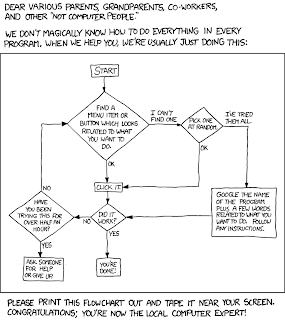What it's like to work for a new professor: (Prompted by an entry by
Janus Professor, which reminded me of a common new professor lament that they never get the great students. I wonder if new PIs realize that their students might suffer as much from the PI's inexperience as a lab manager as the PI is suffering from his/her students' perceived lack of ability.)
Cons:
1. If you are (un)lucky enough to be the first hire, you are automatically the senior-most student. And if your advisor (like mine) does not also hire a post-doc, then you have only your advisor to turn to when you need advice -- a limiting and humbling situation.
2. You are likely to spend a good deal of your first 3-6 months doing things like ordering and hanging clocks and white boards, setting up equipment, and organizing drawers and shelves. All things which do not forward your graduate career, and for which you receive no credit from your advisor.
3. EVERYTHING you need for your research must be ordered. And your advisor will know where to order these items from only about 1/3 of the time.
4. You will often hear something like, "Well it always worked for me this way at Big Name University, so you must be doing something wrong. Ok, got to go."
5. Because your advisor is unfamiliar with the school and department culture, you may struggle more with things like setting up an advisory committee and learning how to prepare for exams.
6. You will likely be made aware -- consciously or otherwise -- that you do not measure up to the standard of your advisor and his/her peers, and so are a disappointment. (Someday, he/she is thinking, I'll get the good students.)
7. You are at the whim of a person who is inordinately stressed out over being a new professor and who may also be tangling with the challenges (and sleep deprivation) of starting a family. Rationality will not be your advisor's strong suit.
Pros:
1. New professors have great enthusiasm for their research, and it's contagious.
2. New professors often have lots of great ideas for research, and may let you have choice in the project you pursue.
3. Being younger makes it easier for you and your advisor to relate to one another, and may lead to a more relaxed atmosphere in the lab. (Our lab is prone to having wine and cheese parties for just about every occasion we can think of.)
4. Having more recently left graduate school than established professors, your advisor may show brief glimpses of humanity and understanding of the personal circumstances of students with new spouses, new homes, and new children.
5. You will likely get your name on a decent number of publications.
6. You will get to know the ins and outs of starting up a lab, which may prove useful if academia is your career path as well.
7. Having had to rely mainly on your own wit and skills (see cons #1), you will gain a stronger sense of independence and confidence than you might have otherwise.

